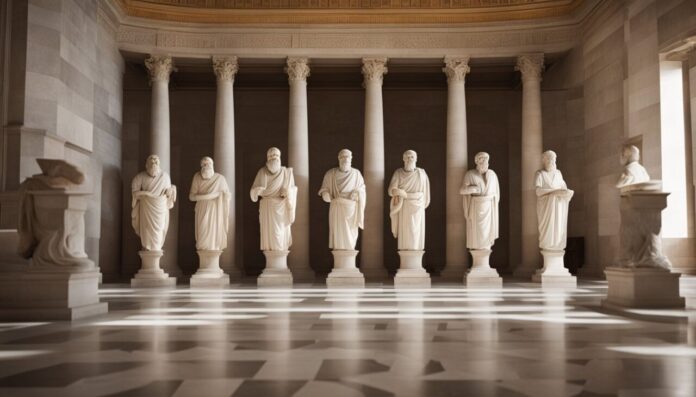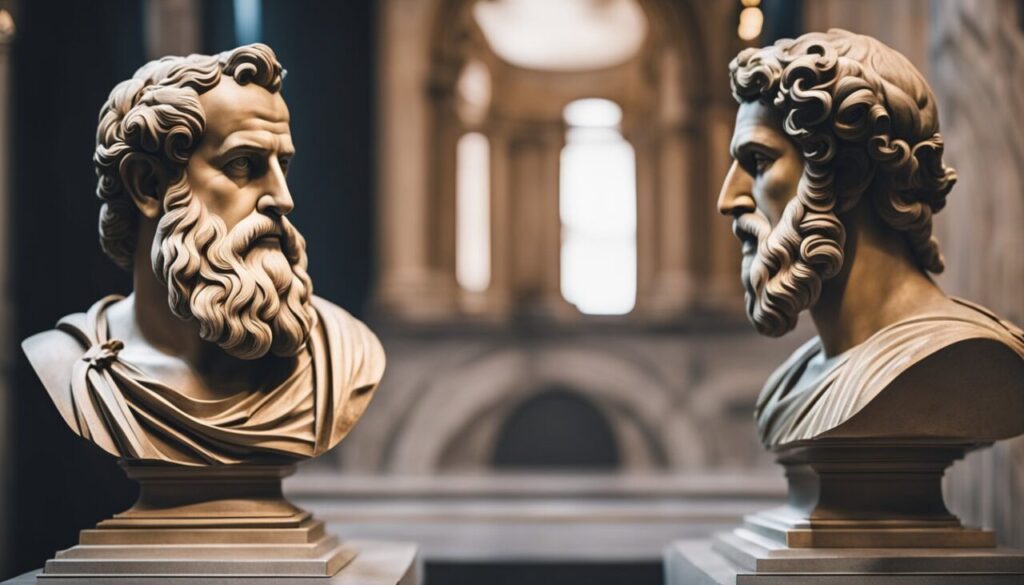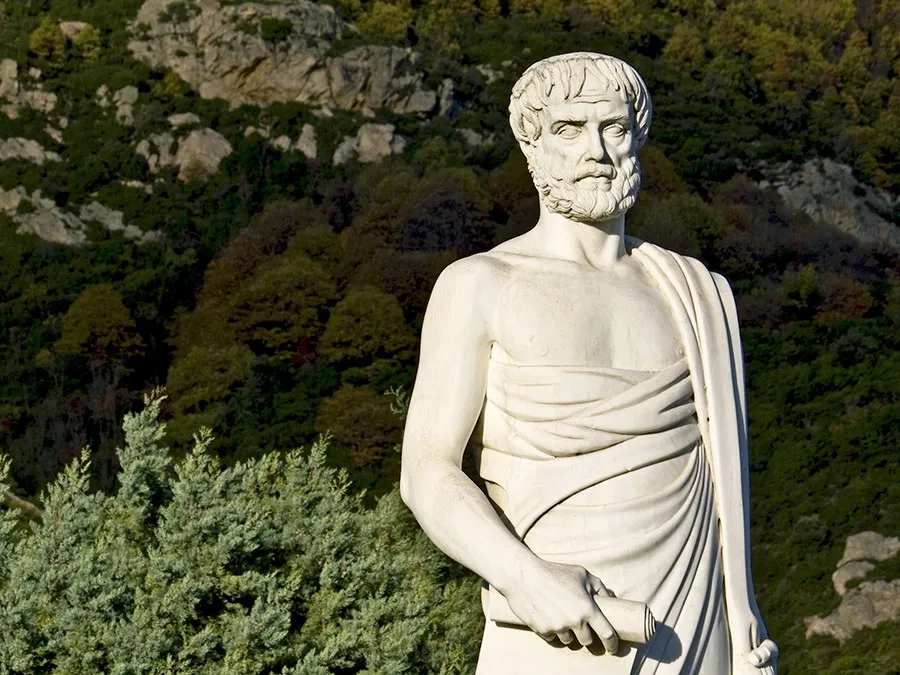
Greek philosophy is certainly one of the most influential intellectual traditions in the world. It has shaped the way we think about ethics, politics, metaphysics, and much more.
And while there have been literally hundreds of Greek philosophers, there are some who stand out as particularly famous and influential.
So, in this article, we will explore the top five most important & famous Greek philosophers.
First, let’s start with a brief overview table and then we’ll dive deeper.
| Philosopher | School | Main Ideas |
| Socrates | Socratic | Known for his method of questioning, the Socratic method, aimed at leading others to a deeper understanding of concepts; Emphasized self-knowledge and virtue as the keys to a good life; Influential despite never writing down his teachings, as they were recorded by his followers, notably Plato. |
| Plato | Platonism | Developed the theory of Forms, positing a perfect, non-physical realm where ideal versions of everything exist; Founded the Academy in Athens, the first institution of higher learning in the Western world; Explored various philosophical topics through dialogues. |
| Aristotle | Aristotelian | Discussed logic, metaphysics, ethics, politics, and more; His works profoundly influenced Western philosophy and science; Founded the Lyceum, a rival school to Plato’s Academy; Tutor to Alexander the Great. |
| Pythagoras | Pythagoreanism | Known for his theorem in geometry, stating that in a right-angled triangle, the square of the hypotenuse equals the sum of the squares of the other two sides; Founded the Pythagorean school, emphasizing the importance of mathematics and music in understanding the universe. |
| Heraclitus | Ephesian | Emphasized the concept of change as the only constant in the universe; Proposed the idea of the Logos as the governing principle behind this change; Founder of the Ephesian School of philosophy, which focused on the study of nature and the universe. |
Socrates

Life and Legacy
Socrates was a famous Greek philosopher known for his unique teaching style and his contribution to the development of Western philosophy.
He was born in Athens in 469 BCE and lived during the height of the city-state’s power.
Socrates was also known for his unorthodox teaching methods, which involved questioning his students to help them arrive at their own conclusions.
Socrates was married to Xanthippe, and they had three children together.
He was “famous” for his frugal lifestyle and his commitment to his beliefs, even in the face of persecution.
Socrates was sentenced to death by drinking hemlock in 399 BCE, after being found guilty of corrupting the youth and impiety.
Not a pretty death, for sure!
Interesting fact: Socrates never wrote any of his teachings down. All of his ideas were recorded by his students, including Plato and Xenophon.
Philosophical Contributions
Socrates’ philosophical contributions were focused on ethics and the pursuit of knowledge. He believed that the most important thing in life was to know oneself and to lead a virtuous life.
Socrates’ method of questioning, known as the Socratic method, was designed to help his students arrive at their own conclusions about the world around them.
He believed that true wisdom came from admitting one’s own ignorance and constantly seeking to learn more about the world.
Plato

Academy and Works
Plato was a Greek philosopher who was born in Athens around 428/427 BC.
He was a student of Socrates and the founder of the Academy in Athens, which was the first institution of higher learning in the Western world.
The Academy was a place where students could study philosophy, mathematics, and science. Plato taught at the Academy for over 20 years and wrote many works during his lifetime.
One of his most famous works is “The Republic,” where he discusses the ideal society and the role of the philosopher in society.
He also wrote “The Symposium,” which is a dialogue about love and desire, and “The Phaedo,” which discusses the nature of the soul and the afterlife.
Interesting fact: The Academy was in operation for almost 900 years until it was closed by the Byzantine Emperor Justinian in AD 529.
Philosophical Ideas
Plato believed that the physical world is not the true reality, but rather a reflection of the world of Forms.
The world of Forms is a perfect, unchanging world that exists beyond the physical world. He also believed that the soul is immortal and that knowledge is innate.
Plato’s philosophy had a significant influence on Western thought, particularly in the areas of metaphysics, ethics, and politics.
His ideas about the ideal society and the role of the philosopher in society have been studied and debated for centuries.
Interesting fact: Plato's name means "broad" or "wide," which may have referred to his broad shoulders or his broad forehead.
Aristotle

Aristotle was a Greek philosopher born in 384 BC in Stagira, Chalcidice.
He was a student of Plato and tutored Alexander the Great.
Aristotle’s works covered a wide range of subjects, including metaphysics, ethics, politics, biology, and physics. He is considered one of the most influential thinkers in Western philosophy.
Aristotelian Logic
Aristotle’s logical system, known as Aristotelian logic, is based on the principle of non-contradiction and the law of excluded middle.
According to this system, a statement cannot be both true and false at the same time, and there is no middle ground between true and false.
Aristotelian logic also introduced the concepts of syllogism and deduction, which are still used in modern logic.
Interesting fact: Aristotle's logical system was the dominant form of logic for over 2000 years, until the rise of symbolic logic in the 19th century.
Ethics and Natural Philosophy
Aristotle’s ethical philosophy is based on the concept of eudaimonia, which means “happiness” or “flourishing.”
According to Aristotle, eudaimonia can only be achieved through a life of virtue, which involves finding the right balance between excess and deficiency.
Aristotle also believed in natural philosophy, which involved studying the natural world through observation and empirical evidence.
Interesting fact: Aristotle's work on ethics and natural philosophy had a significant influence on the development of Western thought, particularly during the Middle Ages.
Pythagoras

Pythagoras was a Greek philosopher and mathematician who made huge contributions to the field of mathematics.
He was born on the island of Samos in 570 BCE and is famous for his theorem in geometry.
Mathematical Discoveries
As mentioned, Pythagoras is best known for his theorem in geometry, which states that in a right-angled triangle, the square of the length of the hypotenuse (the side opposite the right angle) is equal to the sum of the squares of the other two sides.
This theorem is still widely used in mathematics and has many practical applications.
Pythagoras also made significant contributions to number theory and discovered the Pythagorean triple, which is a set of three integers that satisfy the Pythagorean theorem.
Additionally, he founded the Pythagorean school of mathematics, which was one of the most influential schools of thought in ancient Greece.
Interesting fact: Pythagoras believed that numbers were the key to understanding the universe and that everything in the world could be explained through mathematics.
Pythagoreanism
Pythagoreanism was a philosophical and religious movement founded by Pythagoras.
The movement emphasized the importance of mathematics and music in understanding the universe and achieving spiritual enlightenment.
Pythagoreanism also promoted the idea of reincarnation and believed that the soul was immortal and could be reborn in different bodies.
The movement had a significant influence on later philosophical and religious movements, including Platonism and Neoplatonism.
Interesting fact: Pythagoras was also a musician and believed that music had the power to heal the body and soul. He discovered the mathematical relationships between musical notes and is credited with developing the concept of the octave.
Heraclitus

Heraclitus was a pre-Socratic Greek philosopher who lived in Ephesus, an ancient city on the coast of modern-day Turkey, around 500 BCE.
He is known for his emphasis on the concept of change and his belief that everything is in a state of flux.
Doctrine of Change
Heraclitus believed that change is the only constant in the universe. He famously said, “No man ever steps in the same river twice, for it’s not the same river and he’s not the same man.“
He believed that everything is in a constant state of flux and that nothing remains the same.
Heraclitus believed that change is not random, but rather it is governed by a universal law, which he called the Logos.
Logos is the underlying principle that governs the universe, and it is responsible for the order and structure that we see in the world around us.
Interesting fact: Heraclitus is often referred to as the "Obscure Philosopher" because his writings are notoriously difficult to interpret.
Ephesian School
Heraclitus was the founder of the Ephesian School of philosophy, which was centered in the city of Ephesus. The school focused on the study of nature and the universe, and it was known for its emphasis on the concept of change.
The Ephesian School was also known for its belief in the unity of opposites. Heraclitus believed that everything in the universe is made up of two opposing forces, such as hot and cold, light and dark, or love and hate.
He believed that these opposing forces are necessary for the universe to function and that they are in a constant state of balance.
Interesting fact: Heraclitus believed that fire was the primordial element.




























